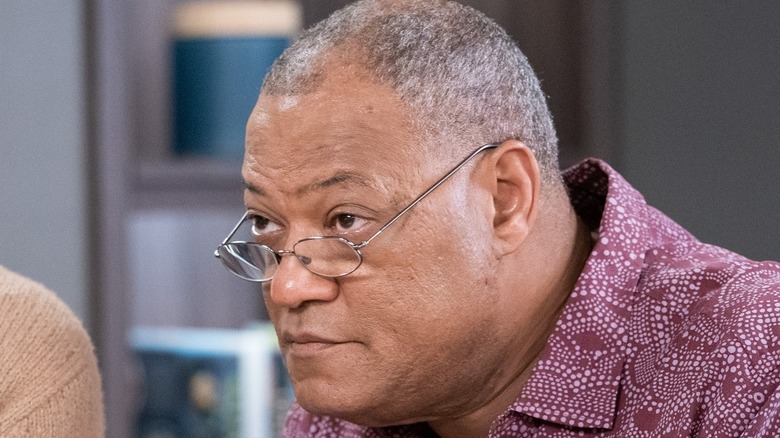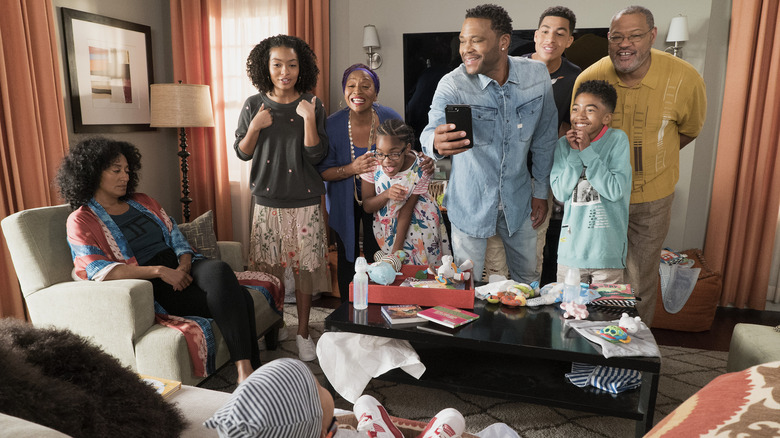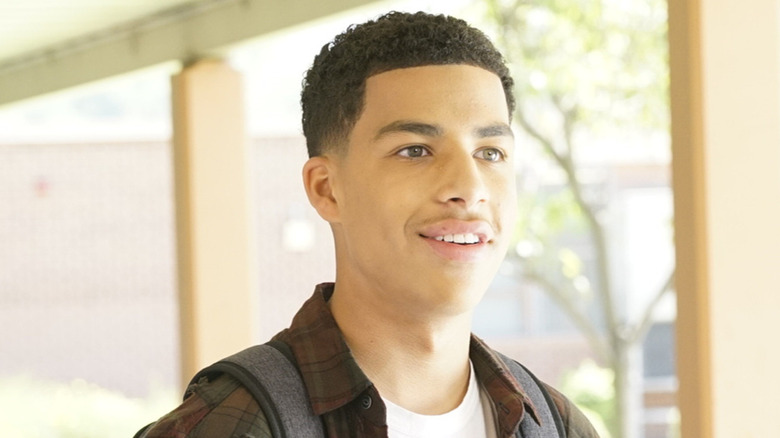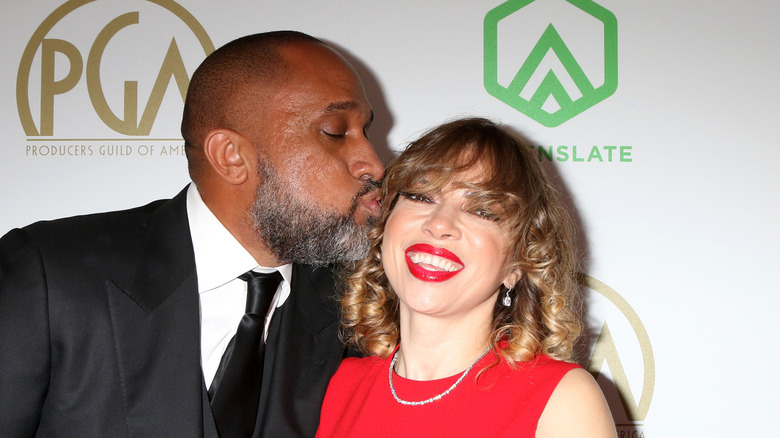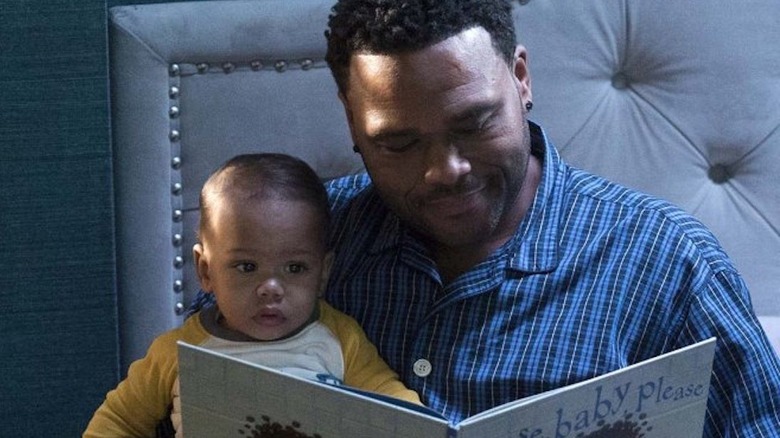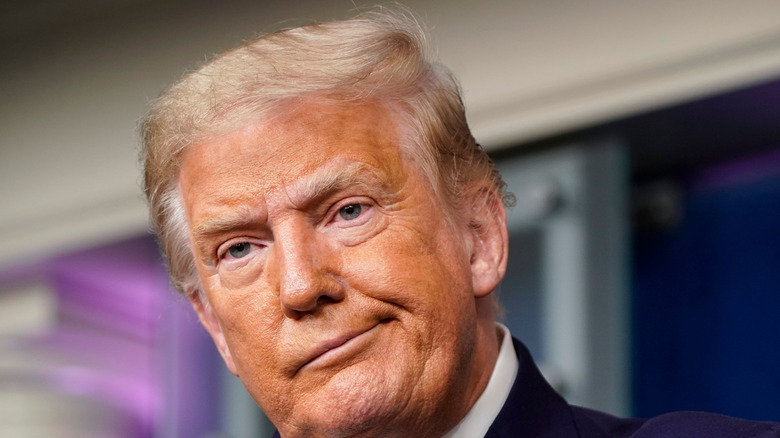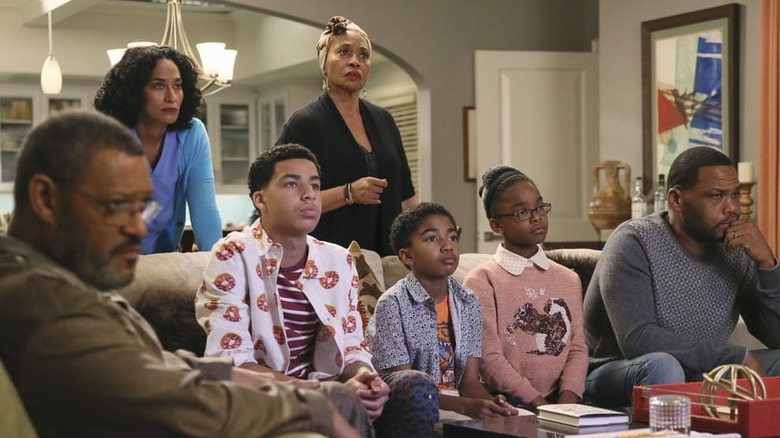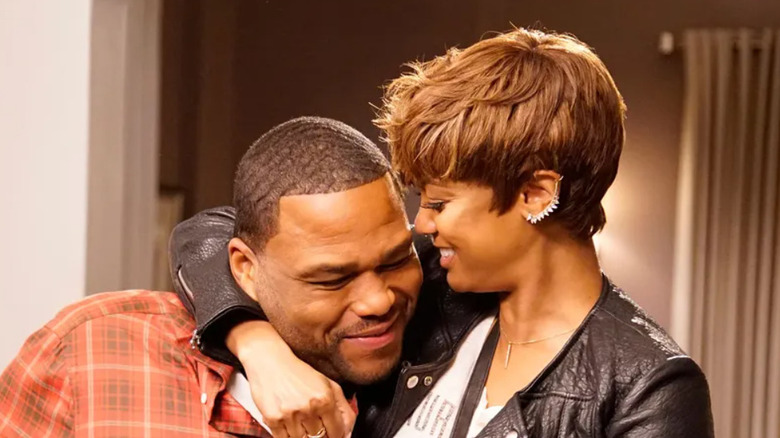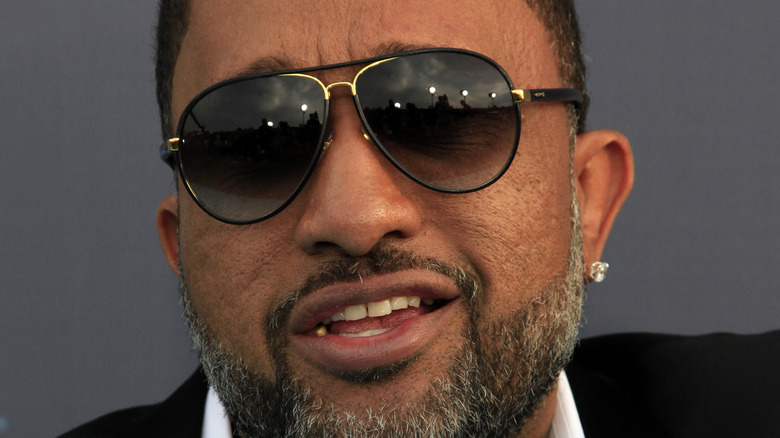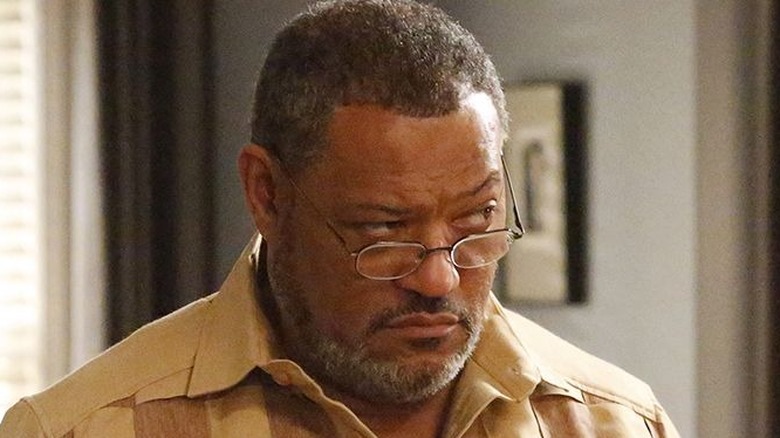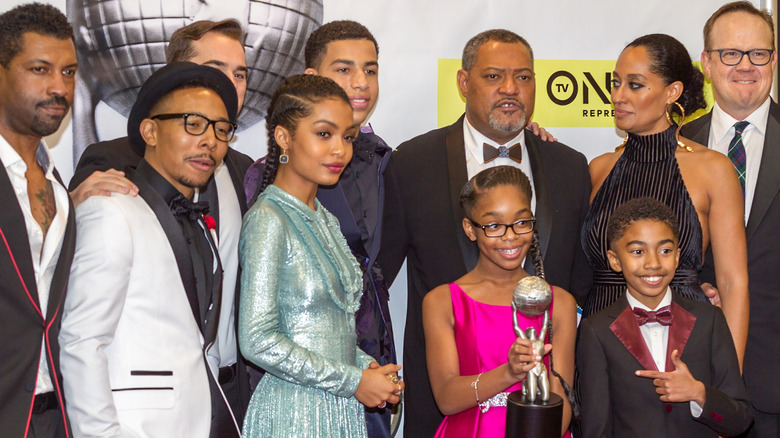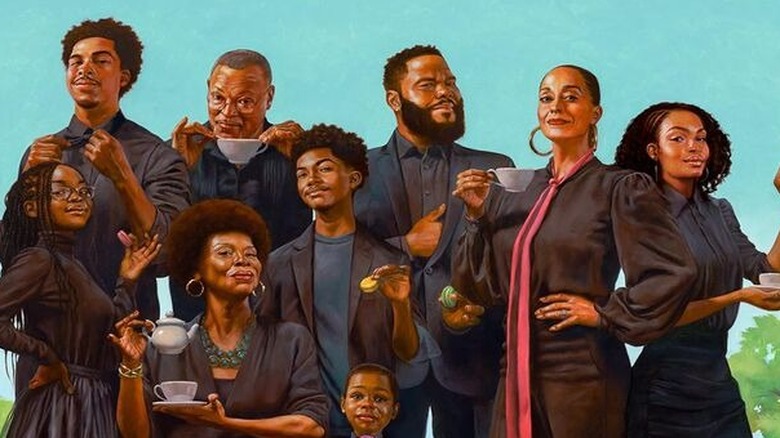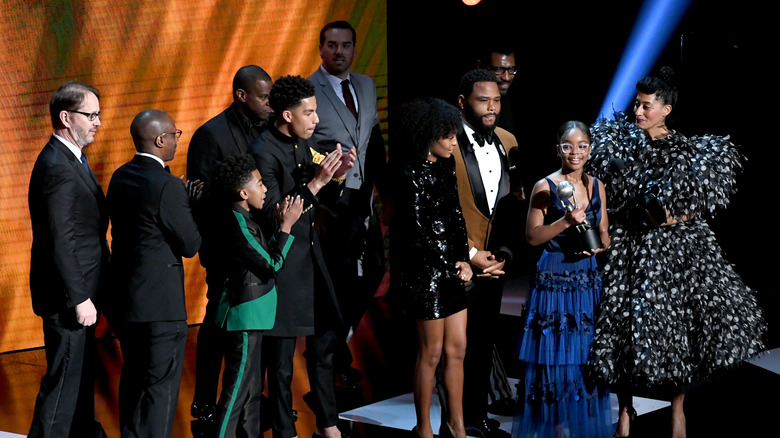The Untold Truth Of Black-Ish
Provocative. Empowering. Racist. Woke. All of these terms have been used to describe ABC's hit family sitcom "Black-ish," though one adjective shines through in nearly every mention, review, or interview about the show: funny.
Whether Black or not (and close to 80% of the audience isn't), everybody seems to get the jokes running through "Black-ish," which makes sense since the general idea of family is the core of the show. Yet, as many have pointed out, "Black-ish" doesn't follow the familiar TV pattern of presenting a family that just happens to Black. Creator Kenya Barris' works magic by pointing out the inequalities the Black community endures, but somehow making them funny. How do you do a whole episode about Juneteenth — that is, an episode centered on slavery, emancipation, and then Jim Crow — and make it entertaining? Especially when the characters telling the story of Juneteenth are thinly veiled versions of your own family members?
The show manages to drop knowledge on its viewing public without seeming like a history doc. That explains why it has won awards and garnered tons of nominations, including a 2021 Emmy nod for Stacey Abrams for her voiceover in a "Black-ish" election special. In a way, the smooth inclusion of issues that Black people face in America has some connection to Season 7 Episode 8, "What About Gary?" in which Dre educates Rainbow's white cousin on Blackness as a response to Gary's white-guilt-fueled desire to do something.
The story behind "Black-ish" is as dynamic as the show. From inspiration to studio intervention, from shouts about racism to accolades proclaiming the show a jewel of the Black community, Barris' journey to tell the Johnson family's story has been nothing short of amazing. Ish.
Black-ish is based on the Barris family
They say write about what you know, but Kenya Barris took that to the next level. "I came up with the premise by living a day in my life with my kids," Barris says in an NPR interview from 2016. As in, this is the Barris family in a series. "You know, my wife is an anesthesiologist. She's mixed," he adds, talking about his wife Dr. Rainbow Barris (Tracee Ellis Ross) — like the wife of Andre Johnson in the series, Dr. Rainbow Johnson.
In fact, many specific things were inspired by his family. "There was a moment in the pilot that we put where Jack didn't know that Obama was the first Black president. And that really happened to me in my life." And that "N-word" episode? "I saw one of [his daughter's] texts and it was 'N-word' this, 'N-word' that. I looked at it and said: 'I don't think [my daughter's friend] should be using this word,'" Barris explains in a Guardian article.
The Barris family has 6 kids, including a baby, similar to the Johnson's 5 kids (including a baby). As Barris continues in the NPR interview, "You're taught to give your kids more, but in giving them more, like, what do they lose? And I think that's sort of the conceit and premise of the show."
How much is really based on this day to day? As Barris says in the Guardian article, "90% of the episodes are based on real life."
Marcus Scribner beat Anthony Anderson's son for the role of Jr.
Marcus Scribner plays Andre Johnson's son, Andre Jr. He's a nerd and, dare we say, a bit soft. And as a Nylon interview with Scribner says, he's making nerds cool again. Jr. is a Harry Potter fan and high school field hockey player, awkward in social situations and overly serious at all times. Yet he has a fun creative career and dates a slew of beautiful women. Scribner nails this study in Black nerddom. And he went into his audition against some tough competition.
"Anthony [Anderson] made sure to come out and let everybody know that his son was auditioning." That's right, the man who plays the main character, Dre Sr., had his real son set to try out for the role of his son on the series. "And he was like, 'None of y'all have a good chance 'cause my son is auditioning for this role!'"
Yet Marcus Scribner, obviously, landed the role. And in a classic Jr. move, Scribner "talked to Nathan [Anderson's son] afterward, he's a really cool guy."
Barris divorce drama
Kenya Barris and his wife, Rainbow, have been on the brink of divorce twice. As in, he's filed for divorce once and Rainbow filed once, and Barris even moved out for a year the second time. Yet both times they reconciled.
It's not surprising, then, that there was a divorce arc in 2018's Season 4. This was a tough one to watch, as Andre and Rainbow's marriage, usually a model of wedded bliss, slowly died a death of a thousand cuts. It seemed serious, and the tension could be felt everywhere from the color filters on the episodes to the fact that these episodes weren't as funny as we'd come to expect from the sitcom.
The most recent filing occurred in 2019. Yet he withdrew it on May 21, 2020, according to an article in theblast.com. Since Rainbow inspired "Black-ish," "Mixed-ish," and "BlackAF," it's obviously a good thing for Barris' future shows.
On his Instagram on July 2021, he posted a picture of Rainbow Barris and him cozying up on a flight with the following words: "@tharealrainbow you are beyond question the love of my life and #grateful is absolutely the word that definitively epitomizes how I feel to have you in my life as my wife and mother of my children."
Thank you, Black Jesus.
Racially charged Black-ish episode from 2017 was shelved until 2020
In 2017, Kenya Barris and his team put together an episode about the racism that had reemerged after the election of President Donald Trump. In the episode, titled "Please, Baby, Please," Dre reads Spike Lee's eponymous 2002 children's book. Dre continues with his own children's story about "The Shady King," full of clips from Trump's inauguration, just to let the audience know that The Shady King is definitely America's newly elected president.
According to a Washington Post article, ABC shelved the episode. Barris claimed he was part of that decision, though he left the network months later for a Netflix deal.
Then "Black-ish" began streaming on Hulu. And in August 2020, the episode finally aired on the streaming site.
Aside from the children's stories, the episode shows the Johnson family discussing topics ranging from the white nationalist rally in Charlottesville to Colin Kaepernick and the history of Black athletes getting blackballed for using their platforms to protest injustice. But then it offers a glimmer of hope.
"That's the thing with our country," Dre tells his baby Davante. "We've gone through a lot. But even in our darkest, we help each other out."
Donald Trump called the series racist
There have been many polarizing works of media over the last few years, and "Black-ish" is on the list. The Obamas love the series, while Trump called it racist. According to Hollywood Reporter, Trump tweeted in 2014, prior to becoming president, "How is ABC Television allowed to have a show entitled 'Blackish'? Can you imagine the furor of a show, 'Whiteish'! Racism at highest level?"
When the show came out, there was hue and cry both about the name and the idea that non-stereotypical Black people are less Black than others, though the show only uses this concept to explore questions of identity. There was even a Change.org protest against the show (it peaked at 262 supporters, far from its goal of 1 million).
While the show does explore a specific, high-income bracket of Black Americans, "Black-ish" is dedicated to pointing out the inequalities still faced by Black people, no matter the socioeconomic bracket.
Black-ish's police brutality episode was lauded
In "Hope," the 16th episode of Season 2, the Johnsons are glued to the TV, watching the trial of several policemen for allegations of abusing a Black teenager. The grown-ups are divided about how to explain the reality of police brutality to the kids. Pops and Ruby (Dre's parents, who live with him) and Dre want to give the kids the truth. Rainbow, on the other hand, wants to give them more of a positive outlook.
"They are not just children, they are Black children and they need to know the world they are living in," Dre tells his wife as he explains why they need to be completely honest with the kids.
The episode hit hard, and received a lot of praise from fans and pundits for its brave stand on police violence.
An ABC News article listed praise from EW, the Washington Post, and fans, to whom the actors and Barris himself responded with praise and appreciation.
"'The Cosby Show' meant a lot to me as a kid, but that could have very easily been a white family. I wanted to do a show about what it was like to be a Black family living in this environment," Barris says in a People article.
Few comedies tackle controversial issues head-on, but "Black-ish" has done so successfully and deftly since its inception over half a decade ago — while still somehow delivering laughs.
Kenya Barris' first big move was selling America's Next Top Model
According to the People article, Barris sold "America's Next Top Model" when he was 30. He talks about it more in-depth during an appearance on the show VICELAND in 2017. Kenya Barris has been friends with Tyra Banks since childhood. Banks even appears several times on "Black-ish" as, surprise surprise, Dre's lifelong friend who's gone on to be a glamorous star.
It's ironic that a man who wrote the comedy "Girls Trip," created all the "-ish" series, and became a Black comedy mogul noted for his brilliant writing made his bones on a game-changing reality contest show. On the appearance, he also talks about how he handled being surrounded by models in various stages of disrobe at all times.
"I used to be like, 'What is happening right now?'" Barris says in the interview. "'Be cool, be professional! Just be professional.'"
We could almost see Andre Johnson giving himself the exact same lecture.
Black-ish inspired a bidding war and Barris chose the money
According to an in-depth New Yorker article detailing Barris' history and inspiration, Kenya Barris wrote several pilots loosely based on his life. Finally "Black-ish" hit, though at first Andre was the diversity hire at a series, based on Barris' experiences as the diversity hire dealing with white writers on the series "Listen Up." While developing the series, ABC recommended comedian Larry Wilmore as a co-showrunner and the two worked on the pilot together. When it came time to sell, Barris has originally imagined the show would get picked up by FX.
At that point, FX was considered "the cable-prestige jewel box." Barris went for the money and the network pressure presented by ABC. Then Wilmore left and Barris shifted to white writer Jonathan Groff, in many ways putting the pressure of being real to "Blackness" squarely on his own shoulders.
This fateful moment led to several more series and a big deal for Barris with ABC.
Fishburne joined thanks to shared representation
There are lots of reasons why an established film actor joins a new TV series. Maybe they just want a change. Or they finally appreciate the prestige associated with television. Or, as in the case of Laurence Fishburne and "Black-ish" creator Kenya Barris, they simply had the same representation.
Laurence Fishburne, who plays Pops, is the show's stable core. Unflappable no matter how many drinks he's had or how many women come into and out of his life, Pops is the exact opposite of the overly dramatic, constantly flustered Dre. While Pops has plenty of funny moments, he's really the eternal straight man. That makes sense since Fishburne isn't really known for his comedic chops. So how did he get involved in a network sitcom? As he explains in Deadline, Fishburne's inclusion in the project was thanks to Paradigm Talent Agency.
"Kenya Barris was represented by the same agency at the time. He was introduced to me by [Paradigm agent] Debbee Klein, and he presented his idea. Myself and my team at Cinema Gypsy, we felt like it was really a perfect fit because it was so relatable, the stories that he was talking about, which are largely drawn from his own life, mirrored stories that came from my life."
ABC wanted a different name
The title, "Black-ish," comes from a line in the pilot in which Dre says he wants his family to be Black, not Black-ish. Dre is worried that their privilege and wealth have separated them from the concept of Blackness he had grown up with as a working-class kid in Compton.
According to the New Yorker article, "Some viewers, especially Black ones, have been put off by the show's title, with its cheeky implication that some people are less Black than others." Apparently ABC had some concerns as well. They'd suggested changing the title to "The Johnsons" or "Urban Family," marrying "Modern Family" with Dre's position as VP of urban marketing. Brilliant. In the article, the writer mentions that Barris had said he was glad he'd resisted ABC's suggestions to sanitize the title.
According to a Slate article, however, despite the issues many had with the title the series has shown enough depth in its discussion of race and class to have earned the right to call itself "Black-ish."
So apparently the show creator was right for sticking to his guns. Good to know.
The new Black-ish painting was done by a real artist
If you stream "Black-ish" on Hulu in 2021, you've no doubt seen the painting of the Johnson family made for season 7. At first, it looks like just a cartoony, Photoshopped picture of a family before you start really looking deeply. Then you realize this is something different, a truly amazing work of art.
It was painted by art star Kadir Nelson, who has long been an illustrator of note. His celebrated works include a Marvin Gaye stamp, 30 children's books, and his striking portrait of Nelson Mandela that graced the cover of the New Yorker in 2013. According to an LA Times article, ABC's marketing department was so impressed by his 2020 New Yorker covers that the network hired him to do the art for Season 7.
Nelson was influenced by COVID to make a painting about a family having a tea party despite the crazy turbulent year going on outside. According to showrunner Courtney Lilly, "Kadir is the right artist of the moment. It was beyond what we asked for."
Nelson has previously worked on the show. He did the illustrations of the "Shady King," a reference to Donald Trump, in the controversial episode that was shelved and just recently aired "Please, Baby, Please."
Black-ish's 8th season will be its last
Kenya Barris had been working in entertainment for years before he finally had his first big scripted hit in "Black-ish." This was his baby, his debut as a scripted TV boss. He somehow delivered comedy and commentary in every episode, telling deep, impactful stories without forgetting to keep people laughing.
According to the Hollywood Reporter article, though, Barris was in talks to get out of his contract with ABC shortly after the "Please, Baby, Please" controversy. And he'd had issues with ABC's decision to reboot "Roseanne." No matter the reason, he left ABC for a big deal with Netflix in 2018 (a deal that he has walked away from).
So it's no surprise that ABC is out of the "-ish" business. It canceled the spinoff "Mixed-ish" after two seasons, and "Grown-ish" moved to Freeform. ABC has announced that Season 8 will be the final season of "Black-ish." According to the previously linked Newsweek article, though, Barris says the show is ending because he's ready to end it, not because of any bad blood with ABC.
Whatever the reason, Season 8 will drop all the wisdom, controversy, and laughs we've come to expect from this award-winning series.
